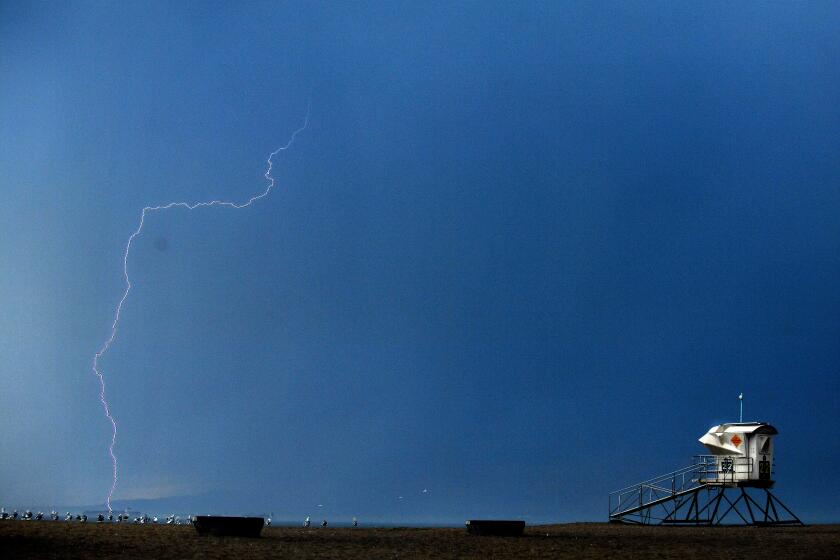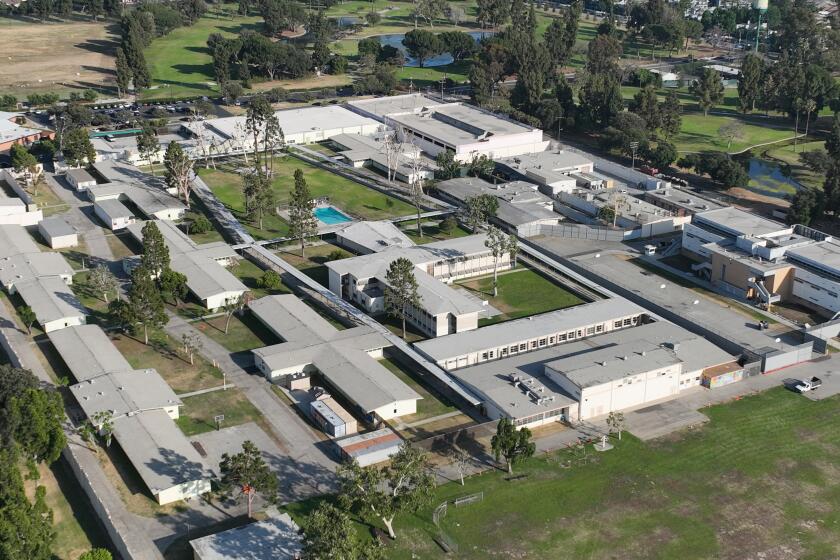Pride Endured as City Declined : Black Middle Class Keeps the Faith for Compton
- Share via
It started with the Watts riots of 1965, when white business owners fled downtown Compton, turning the once bustling community of frame houses and minor commerce into a virtual ghost town.
Maxcy Filer remembers. “This may sound ridiculous,” said the Compton city councilman, who moved to Compton in 1952. “But some people were moving out so fast they were leaving their doors open.”
Left behind were deserted storefronts, boarded-up homes and a floundering economy. With the businesses went jobs. With unemployment came crime. Before long, many of the professional blacks who had flocked to the community known as the “Hub City” were also in flight--to Cerritos, to Torrance, to Carson. Anywhere but Compton.
But some, for a host of reasons, chose to stay. There remains today in Compton a small but thoroughly stubborn black middle class, pockets of people who seem as proud to live there now as they and others were 30 years ago, when Compton was a magnet for the region’s upwardly mobile blacks. They have learned to co-exist with their city’s blight and crime, which some of the residents maintain have been exaggerated by those who live elsewhere.
Johanna Martin-Carrington, a South Carolina native who moved to Compton nearly 29 years ago, has raised six children in Compton and seen five of them return to the community as adults. She said her neighbors who have stayed have done so for the same reasons--memories, and a sense of home that transcends actual walls.
“I have a girlfriend who lives in Irvine,” said Martin-Carrington, a district manager for the U.S. Census Bureau. “She has a beautiful home. She’s successful. But she doesn’t know her neighbors. When I drive down the street in Compton, the kids move out of the street and say, ‘Hi, Ms. Carrington.’ My neighbors know me. (And) what is living?
“It always felt good to come home,” she said. “And when I say home, I don’t mean just coming home to a house. I mean coming home to a community. We are not trapped in Compton. We are in Compton by choice.”
According to U.S. Census Bureau figures, less than 3.5% of the households in Compton--a city of 92,000 just south of Los Angeles--earn more than $50,000 a year. These people tend to live in pockets scattered throughout Compton, side by side with neighborhoods that have seen the worst of the city’s decline.
Sometimes the contrast between well-to-do and down-and-out in Compton is vivid. For instance, it is possible in Richland Farms, one of the premier neighborhoods where some residents still sell ducks and farm-fresh eggs from behind white picket fences, to find a spotless ranch-style home with a Mercedes-Benz parked in the driveway next to an empty lot where a makeshift memorial to a slain gang member has been spray-painted on a wall. Even some of the most solid citizens feel the need to arm themselves.
Cause for Hope
Those who have stayed now find cause for hope in the new businesses cropping up along Compton Boulevard, the city’s main commercial strip, and the new housing developments on lots where apartment buildings had been allowed to deteriorate.
“I figure I have weathered the storm,” said general building contractor David Briggs, who has lived in Compton 23 years. “I figure that Compton still has a ways to go, but it’s coming back. So why leave it now? Why abandon the ship after you dock?”
A storm seems a rather gentle metaphor for what has befallen Compton. Two decades after the Watts riots, 25% of Compton’s residents are on welfare, which the old-timers recall was not the case in the city’s heyday. Its unemployment rate was 9.2% as of April, more than double that of the county. Violence is an almost daily fact of life, so much so that it seems most outsiders have come to equate Compton with gang murders.
Middle-class residents are often called upon to defend Compton’s image from those who would dismiss it as a regional war zone.
It makes Marjorie Shipp angry. “When I go out of the area and I write a check, it’s like ‘Oh, you’re from Compton.’
“(They) have to see two or three ID’s to make sure that I’m legitimate,” said Shipp, a teacher in the Compton Unified School District who lives in Richland Farms. “My kids say, ‘I tell (friends) I’m from Compton and they frown on it.’ And I say, ‘You tell them you know who you are and it’s OK to be from Compton.’ ”
Birdie Baldwin, 63, a retired nurse who lives with her husband down the street from Shipp, said that “at one time I had a way of saying, ‘I’m from Richland Farms.’ And if they kept asking, I’d have to say it’s a part of Compton.
“It wasn’t so much that I was ashamed,” explained Baldwin, who has lived on an acre of land in Compton for more than 35 years. “I just didn’t want them to condemn it. I didn’t want to have to defend it.”
It wasn’t always this way.
Blacks started moving into Compton in the 1950s. It attracted the middle class--doctors, lawyers, postal workers and other civil servants, many originally from the South--people who wanted to move a step up and away from Los Angeles.
“We couldn’t live in Glendale,” Filer explained, remembering the segregation--both unofficial and, in some cases, sanctioned by tract covenants--that kept blacks virtually confined to South Los Angeles. “We couldn’t live in Lynwood. We couldn’t live in South Gate. Compton was our suburbs.”
At first blacks could not live east of Willowbrook or south of Rosecrans avenues, leaving only a corner of Compton for them to reside in. But in the late 1950s many black members of the Los Angeles Dodgers and other blacks started moving into a Compton neighborhood called Henrietta Square, Martin-Carrington said.
She and her husband were among the first blacks to move into a neighborhood known to old-timers as the “Hollywood” of Compton. In 1956, a black Marine integrated Richland Farms, a former farming community, and in 1958 Compton High School crowned its first black homecoming queen.
Status Address
“There was no lower-income community (in Compton) back then,” said Filer, 58, who has lived in Henrietta Square for more than 30 years. “There were no welfare recipients. Everybody had a job. (And) if you could give a Compton address, boy, you had status.”
Birdie Baldwin remembers when the city started to change. In the late 1960s she began to see gang graffiti creep up and scar Richland Farms. The big supermarket on the corner of Alondra Boulevard and Wilmington Avenue where she used to shop closed down. And at least 10 families she knew moved away. She refused.
“Our life is here. We’ve put too much into it,” said Baldwin, explaining why she did not follow her neighbors into the “new” suburbs.
Crime Problem
Compton had 82 homicides last year, and some of the middle-class residents who have stayed concede that crime is out of hand. Others, clinging to a sense of civic pride, downplay it, saying it is no worse than in other cities. Whatever their perspective on the sensitive topic, those who stayed behind share one common sentiment about crime--nothing gets solved by running from it.
“The crime is out of control,” said Baldwin, who hears gunshots when she goes to bed at night and has caught addicts shooting up drugs in the shadow of her hedges.
Said Baldwin’s husband, Eugene, a retired equipment mechanic: “I don’t go out to let my wife in (the front gate) unless I have my gun with me. Not at night.”
A room upstairs with two bullet holes left over from a neighborhood gang fight reminds him to carry the .38 Colt revolver, he said.
‘Running Doesn’t Help’
David Briggs, 64, who came to Compton right before the Watts riots, centered a mile south, said he knows crime and drugs are in Compton. “But running doesn’t help. . . . You should stay, say ‘This is our town’ and make it better.”
And that’s what he did. A contractor and owner of an import-export business, Briggs said he owns property in places as far away as Belize and Thailand. But when he decided to build a lavish restaurant--complete with stained glass, imported teakwood furniture and a waterfall--he bypassed Beverly Hills and similar upscale dining areas. He settled for a spot in Compton across Central Avenue from a Church’s Fried Chicken and a barbecue joint.
Scheduled to open in July, Briggs’ King David’s restaurant will be Compton’s only upscale eating establishment, city officials said.
“People told me I was crazy for investing all this money into Compton. They insulted me,” said Briggs, who has spent five years and more than $1.5 million on the restaurant, which many people have jokingly dubbed the “Taj Mahal” of Compton. “(But) being a building contractor I felt I had something to give back to the young people. (To tell them) ‘We can do it. We don’t have to tear it down. We can build it.’ ”
During the five years of construction, Briggs said, no graffiti has been sprayed on the building, which has only a wrought-iron fence for protection. A shattered display window has been the only act of vandalism.
Briggs said it doesn’t take a genius to figure out why there has been so little trouble. “You know when you start making something beautiful, everybody wants to get in on it. It’s like if you throw a rock, everybody wants to throw a rock. It you start fixing something, then everybody wants a paint can.”
Affordable Housing
There are practical reasons to stay in Compton, say those who could have afforded to move elsewhere but did not. They cite its central location and relatively affordable housing. And then there are the reasons that come from the heart.
“I stayed because it’s one of the most neighborly places I’ve ever seen in my life,” Filer said. “I stayed because my children were raised in Compton, and my children are coming back here. I stayed because this is a place blacks can make an imprint, not on California but on the world. And I love Compton.”
Jesse L. Robinson, 77, is a Compton pioneer among blacks. He came to the city in the late 1940s and, 35 years ago, founded its branch of the National Assn. for the Advancement of Colored People in his living room.
Robinson, who punctuates his careful speech with emphatic hand movements, stood recently in the midst of the fruit trees that dot his acre of land and reflected on his life in Compton, his large, two-story house and his community.
“My grandfather died on this place,” said Robinson. “My mother-in-law died here, my mother, my stepfather. . . . (Compton) has been a launching pad for my college education. It’s been a launching pad for all the nice things that happened in my life.
“This is my home.”
He has seen a lot of change, some of which saddens him, but Robinson--a retired postal superintendent who has traveled the world and filled his house with mementos--said he never considered moving away from Compton.
Why not?
“Well,” he said. “I would’ve been a phony. Wouldn’t I?”
More to Read
Sign up for Essential California
The most important California stories and recommendations in your inbox every morning.
You may occasionally receive promotional content from the Los Angeles Times.













